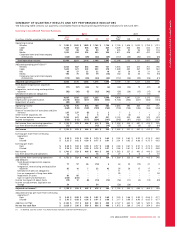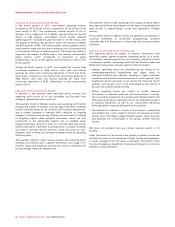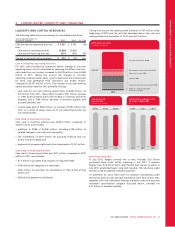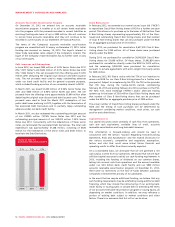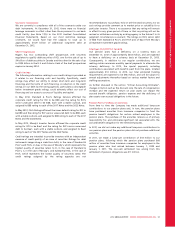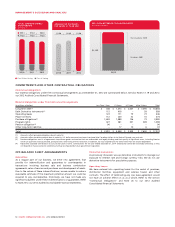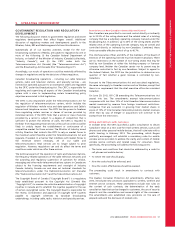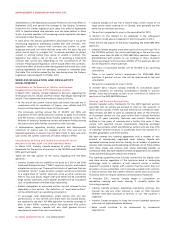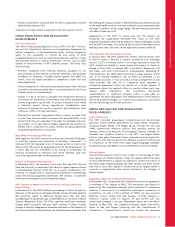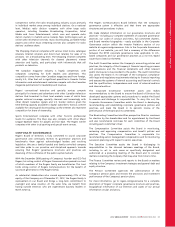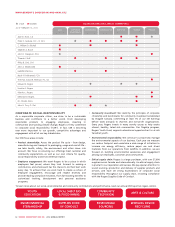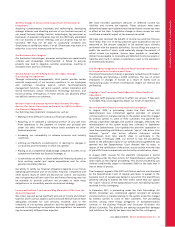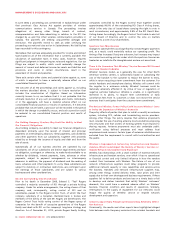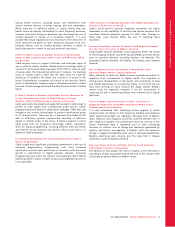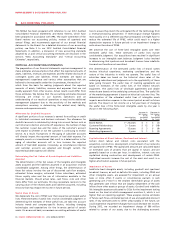Rogers 2012 Annual Report Download - page 62
Download and view the complete annual report
Please find page 62 of the 2012 Rogers annual report below. You can navigate through the pages in the report by either clicking on the pages listed below, or by using the keyword search tool below to find specific information within the annual report.MANAGEMENT’S DISCUSSION AND ANALYSIS
Amendments to the Manitoba Consumer Protection Act took effect in
September 2012 and parallel the changes to the Quebec Consumer
Protection Act. Similar legislation also came into effect in September
2012 in Newfoundland and Labrador and has been tabled in Nova
Scotia. A private member’s bill proposing similar legislation has been
introduced in New Brunswick.
In April 2012, the Ontario government announced that it would be
introducing legislation addressing wireless bills and contracts. The
legislation seeks to ensure that contracts are written in plain
language and spell out which services come with the basic fee and
which would result in a higher bill. It requires providers to obtain
consent in writing before they renew or amend a contract. The
legislation also seeks a cap on the cost of cancelling a fixed-term
contract that would vary depending on the circumstances of the
contract. The proposed legislation, which would affect new contracts,
would take effect six months after being passed and would also cover
existing agreements that are amended, renewed or extended after
that date. This initiative ceased for the time being when the Ontario
Legislature was prorogued in October 2012.
WIRELESS REGULATION AND REGULATORY
DEVELOPMENTS
Consultation on the Renewal of Cellular and Personal
Communications Services (“PCS”) Spectrum Licences
In March 2011, Industry Canada released its decisions regarding the
renewal process for cellular and PCS licences that began expiring that
month. The fundamental determinations were as follows:
• At the end of the current licence term and where licencees are in
compliance with all conditions of licence, new cellular and PCS
licences will be issued with a term of 20 years; and
• The previously existing annual fee of $0.0351 per MHz per
population of the licenced area will continue to apply to all cellular
and PCS licences, including those initially assigned by auction. The
Minister of Industry Canada may review and amend the fees during
the licence term after further consultation with licencees.
A determination regarding existing research and development
conditions of licence was not released at this time and will be
released separately. A decision has not been made to date, and until
such a time, the current conditions of licence remain in effect.
Consultations on Policy and Technical Frameworks for the
Auction of 700 MHz Band and 2500-2690 MHz Bands
In March 2012, Industry Canada released its policy and technical
framework for the auction of spectrum in the 700 MHz and 2500-2690
MHz spectrum bands.
These are the key aspects of the policy regarding the 700 MHz
spectrum:
• Industry Canada did not establish a set-aside as it did in the 2008
Advanced Wireless Services (“AWS”) spectrum auction, and instead
adopted an auction cap. There are four blocks of spectrum that are
considered “prime”. Large domestic wireless carriers are restricted
to a single block of “prime” spectrum, while all other carriers are
held to two such blocks. Rogers, Bell and TELUS will be considered
large carriers nationally, while SaskTel and MTS will be considered
such in Saskatchewan and Manitoba, respectively.
• Bidders designated as associated entities are not allowed to bid
separately in the auction. The definition of “associated entities”
will be determined in an upcoming consultation.
• To encourage rural deployments, single carriers who win two
paired blocks, or two carriers who share their two paired blocks,
are required to use their 700 MHz spectrum to provide coverage to
90% of their HSPA+ territory within five years and 97% within
seven years. Industry Canada will also draft general roll-out
requirements under their next consultation.
• Industry Canada will use Tier 2 licence areas, which consist of 14
large service areas covering all of Canada, that generally are the
same size as individual provinces.
• The auction is expected to occur in the second half of 2013.
A decision on the matters to be addressed in the subsequent
consultation noted above is expected in the first quarter of 2013.
These are the key aspects of the policy regarding the 2500-2690 MHz
spectrum:
• Industry Canada adopted a spectrum cap (not an auction cap like in
the 700 MHz auction). No carrier participating in the auction may
possess more than 40 MHz of 2500-2690 MHz spectrum. Rogers is
grandfathered with respect to our holdings in those situations
where we already hold more than 40 MHz of this spectrum. We will
not be required to return spectrum.
• The status of associated entities will be decided in an upcoming
consultation.
• There is no special roll-out requirement for 2500-2690 MHz
spectrum. A general roll-out rule will be determined in the next
consultation.
• The auction is expected to occur in 2014.
In October 2012, Industry Canada released its consultation paper
seeking comments on licencing considerations related to auction
format, rules and processes, as well as on conditions of licence for
spectrum in the 2500-2690 MHz band.
Roaming and Network Sharing Policy
Industry Canada’s policy framework for the AWS Spectrum auction
prescribes that all carriers are allowed to roam on the networks of
other carriers outside of their licenced territories at commercial rates.
New entrants are able to roam at commercial rates on the networks
of incumbent carriers for five years within their licenced territories
and for 10 years nationally. National new entrant licencees are
entitled to five years of roaming and a further five years if they
comply with specified roll-out requirements. Roaming privileges
enable new entrants, which are defined as carriers with less than 10%
of Canadian wireless revenue, to potentially enter the market on a
broader geographic scale more quickly.
We have entered into roaming agreements with a number of new
entrants at commercially negotiated rates. Industry Canada also
mandated antenna tower and site sharing for all holders of spectrum
licences, radio licences and broadcasting certificates. All of these entities
must share towers and antenna sites, where technically feasible, at
commercial rates. We have reached commercial agreements for antenna
tower and site sharing with several new entrants.
The roaming capabilities must provide connectivity for digital voice
and data services regardless of the spectrum band or underlying
technology used. In addition, a host network carrier is neither
required to provide a roamer with a service that the carrier does not
provide to its own subscribers, nor to provide a roamer with a service,
or level of service, that the roamer’s network carrier does not provide.
The policy does not require seamless communications handover.
In February 2012, Industry Canada began a consultation on
mandatory roaming and tower sharing. It currently makes the
following proposals:
• Industry Canada proposes expanding mandatory roaming. Any
licencee can ask any other licencee to roam on their network
whether they have spectrum in territory or not. The duration is
indefinite.
• Industry Canada proposes to keep the current seamless handover
rules and not require seamless handover.
• Rates would continue to be determined by commercial
negotiations.
58 ROGERS COMMUNICATIONS INC. 2012 ANNUAL REPORT



